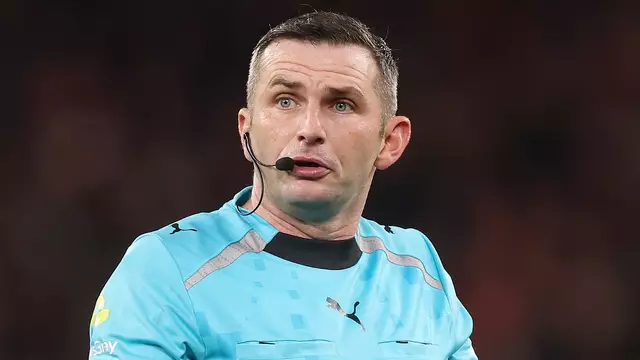Sport
Michael Oliver Is Banned From Officiating Two Clubs Amid Liverpool VAR Controversy

Michael Oliver, one of the Premier League’s most high-profile referees, has found himself at the center of controversy once again following his involvement in Sunday’s clash between Liverpool and Manchester City. Acting as the Video Assistant Referee (VAR), Oliver’s decision to disallow Virgil van Dijk’s first-half goal has triggered a wave of criticism and reignited debates over the integrity and consistency of VAR in English football.
The match itself was already one of the season’s most anticipated fixtures, but the controversy surrounding Liverpool’s disallowed goal has stolen the headlines. Van Dijk appeared to have scored with a powerful header, but the goal was ruled out after VAR deemed that Andy Robertson, who was in an offside position, had interfered with play. The ruling infuriated both Liverpool players and supporters, with many questioning how Robertson—who ducked and clearly avoided the ball—could be judged as obstructing the goalkeeper’s view.
The Premier League released a statement defending the decision, claiming that the “referee’s call of offside and no goal was checked and confirmed by VAR.” The league maintained that Robertson’s positioning and movement constituted an “obvious action” affecting the goalkeeper’s ability to react. However, the statement has done little to calm the outrage from Liverpool fans who saw the call as another example of inconsistent VAR intervention.
Arne Slot, Liverpool’s manager, did not hold back in his post-match comments. He called the decision “obvious and clearly wrong,” pointing out that Robertson had made no attempt to play the ball. “He didn’t interfere at all with what the goalkeeper could do,” Slot said. His frustration was shared by much of the football community, as pundits and fans alike took to social media to demand greater accountability from referees and the VAR system.
Adding another layer to the drama, it has come to light that Michael Oliver is officially banned from officiating matches involving Newcastle United and Sunderland. The restriction stems from his personal background—Oliver is a lifelong Newcastle supporter and even played for the club at youth level. The Premier League enforces such bans to avoid any potential conflicts of interest, ensuring that referees remain neutral and impartial in their appointments.
Oliver explained in a past interview that referees are required to declare any club allegiances or family connections at the start of every season. “You can’t do any match involving that team,” he said, “and I can’t do Sunderland either, for obvious reasons.” He further clarified that if Newcastle were ever in a relegation battle, he would also be ineligible to officiate any matches that could indirectly affect their position in the table, such as those involving rival clubs.
Keith Hackett, the former head of the Professional Game Match Officials Limited (PGMOL), has confirmed that such restrictions are standard procedure. Every referee undergoes a background audit before the season begins, disclosing details about their history with clubs, family associations, and even where they reside. These measures, Hackett explained, help avoid even the perception of bias in a sport where fairness is constantly under the microscope.
Despite his reputation as one of England’s most reliable referees, Oliver’s recent performances have sparked debate about referee accountability and transparency. His previous run-ins with Liverpool fans—most notably during the 2-2 draw against Everton earlier this year—have compounded the tension. That match saw controversial red cards issued to Liverpool’s manager Arne Slot and his assistant, decisions that many felt were unnecessarily harsh and inconsistent.
Following Sunday’s VAR decision, online discourse erupted with calls for structural reform in how referees are evaluated and held responsible. Many fans argue that referees should face post-match interviews just like players and managers, forcing them to explain contentious calls publicly. Others insist that the PGMOL should consider rotating officials more frequently to avoid recurring tensions between certain referees and specific clubs.
For Liverpool, the sense of injustice lingers. The disallowed goal came at a crucial moment in the match, which they went on to lose 3-0. The defeat widened the gap between them and the league leaders, and the manner of the loss has added psychological weight to their title challenge. Players and supporters alike feel robbed of momentum, and the trust in the VAR process continues to erode.
Michael Oliver, meanwhile, remains under scrutiny. His dual status as both one of England’s top referees and one of its most polarizing figures places him in a difficult position. While his professionalism is largely respected within officiating circles, his repeated involvement in controversies—particularly those affecting Liverpool—has created a perception problem that may take time to repair.
As the debate intensifies, one question looms large: is the problem the technology or the human judgment behind it? For many, the answer lies not in abolishing VAR but in enforcing greater transparency, consistency, and accountability from the officials who use it. Until then, the controversies that surround referees like Michael Oliver will continue to dominate the conversation in English football.

 Sport11 months ago
Sport11 months ago“I’m not trying to criticize Ancelotti, but I’m not happy with him for benching that player”: Bellingham Expresses Frustration Over Ancelotti’s Tactical Decision

 Sport11 months ago
Sport11 months agoBREAKING: Manchester City vs Liverpool Clash Cancelled! Title Race Takes a Twist

 Sport11 months ago
Sport11 months agoArsenal Poised for January Swoop on €70 Million Star Dusan Vlahovic

 Sport11 months ago
Sport11 months agoWHAT ON GOD’S GREEN EARTH DID WE JUST SEE?!

 Sport11 months ago
Sport11 months agoReal Madrid: Carlo Ancelotti’s Surprising Revelations About an Unexpected Quality of Vinicius

 Sport11 months ago
Sport11 months agoBREAKING: Arsenal’s Champions League Quarterfinal Opponent Revealed After Monaco’s Dramatic Win – Tough Challenges Await Arteta’s Men

 Sport11 months ago
Sport11 months agoChelsea Players Facing Suspension as Yellow Cards Mount

 Sport11 months ago
Sport11 months agoKey Arsenal Player Set for Return as Gunners Face Struggling Everton
















